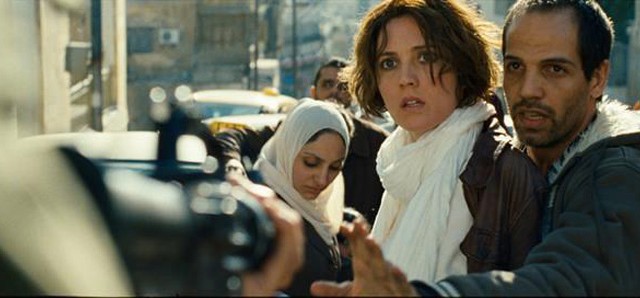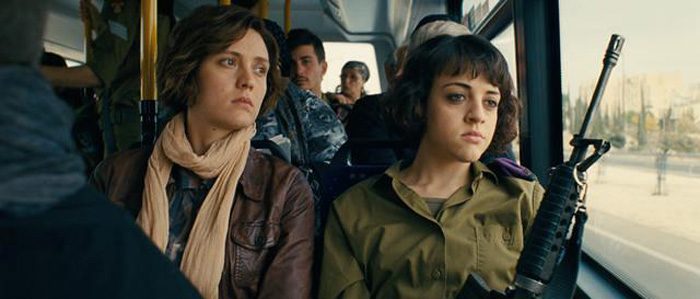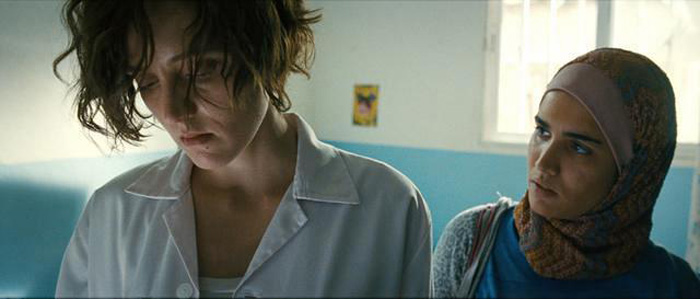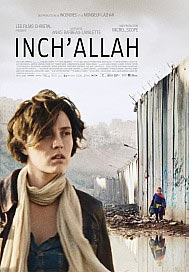It’s truly amazing to watch how guilt, regret, and sorrow can change the very make-up of your character. It may only be for a brief while, but that moment can impact the lives of many in tragic and devastating ways. This is the portrait of the war-torn area in the Middle East housing Israeli and Palestinian hostilities that writer/director Anaïs Barbeau-Lavalette shares in her powerful new film Inch’Allah. A work marked by an unparalleled authenticity through its performances and depictions of the emotional turmoil wrought, we follow a Canadian doctor as she attempts to exist in both worlds. Naively idealistic, Chloé (Evelyne Brochu) believes she can bridge the gap and make a difference. The inevitable reality that the situation will instead change her is a sobering, heartbreaking experience.

Living in Israel, Cholé makes the commute to the Ramallah clinic employing her daily. Close friends with neighbor Ava (Sivan Levy)—a soldier at the border checkpoint—the two ride the bus together, saying goodbye until the latter lets the former back in at night. There is a noticeable bond between them drinking wine, going to Tel Aviv for some clubbing, and discussing their emotionally draining days, but Ava will never treat Chloé as an equal when politics come into play. Desperate for her Israeli friend to understand the people on the other side are human too, the Canadian constantly talks about a patient named Rand (Sabrina Ouazani) with whom she has become close. Unwillingly to dismiss the subject as the lost cause it is, Chloé’s dual sympathies end up the very thing cementing her position as an outsider of both.
Despite not living there, however, it’s Ramallah where she spends most of her time. Working with expectant Palestinian mothers makes it easy to begin understanding their struggles once the oppressive Israeli military starts hindering her job. Rand is an innocent in all of the chaos, carrying the child of her imprisoned husband Ziad who readies for what could be a long jail term. With the young Safi (Hammoudeh Alkarmi) and her mother already under her watch, the days of sifting through garbage piles for plastic are broken only by visits with Chloé bringing hope for the future. Their optimism unites them and Rand’s family accepts this stranger into their home. Even her rebel-sympathizer brother Faysal (Yousef Sweid) finds himself letting his guard down after warming to her charms.

And then everything changes. Tensions mount, trigger fingers tighten, and the streets become a danger after an Israeli camp is attacked. A complete disregard for the sanctity of life runs rampant and Chloé is helplessly trapped in the middle. No one cares who she is or where she’s from—it’s not her war. Witnessing atrocities on one side of the border, she discovers her friend on the other could care less. Ava and Rand have their own people to worry about and despite not being directly involved in the massacre, they have a very real sense of nationalism above humanity. Ava can’t worry about murdered Palestinian children when she has two fellow Israelis seriously injured; Rand can’t acknowledge the soldiers occupying her home are just doing a job when they block hospital entry for women in labor. Reason and morality become unaffordable luxuries.
Barbeau-Lavalette portrays this world with meticulous care as we easily enter the fray possessed with the same sunny disposition as the lead. We want Chloé to bring Ava and Rand together in some cheery, revelatory way that brings a ray of hope to an otherwise pitch-black situation but know deep down it’s not to be. There is a genuine love on behalf of Brochu for both sides of the border—her naivety pushing Ava to say “hello” to Palestine on her phone a sweetly endearing gesture of a woman lying to herself about the gravity of their vitriol towards one another. The simple fact Chloé can ask a favor and bring Rand’s family into the Israeli territory where they once lived proves the issue at hand. Faysal cannot be grateful for an enemy’s permission when it was his land to begin with.

Watching these relationships evolve into more than just a passing acquaintance between strangers only becomes more precious when they begin to disintegrate. The threat of death increases and everyone goes on alert as friendships are tested and Chloé’s ability to stay out of the fight wanes. A final series of events unfolds that will punch you in the gut yet make you hard-pressed to really blame any of the characters for their decisions—no matter how horrific. This fight for a war-torn homeland has spiraled out of control, sucking in all who dare come too close by altering perceptions and causing intrinsically good people to do unforgivable acts. Chloé’s place as an outsider begins to overshadow all good intention and the pain from the resulting anger isolates her into making the most important choice of her life.
Inch’Allah fearlessly puts a face to the horrors in the Middle East and shows just how heavy the stakes are. We can pontificate all day from our homes in America about which side is right or what can be done to solve the problem, but we’ll never know the crippling sense of helplessness until caught inside the fray. Where Ava and Rand are mistaken is the fact that Chloé’s mere presence makes her a part of the struggle. By the end, this Canadian doctor will make it her war and the ramifications of that truth will indelibly change everything she—and we—had known. You can only get pushed so far before breaking; it’s what you do to put yourself back together that’s significant.
Inch’Allah is playing the Toronto International Film Festival Sept. 8th & 10th.


